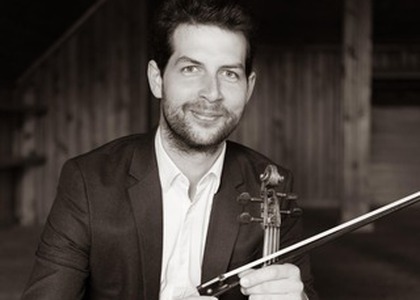> Interviews

Interview with violinist Valentin Șerban
Violinist Valentin Șerban will give a recital on Sunday, November 16th, 2025, at 7:00 PM, at the Romanian Athenaeum, alongside pianist Mihai Diaconescu. The artist spoke about this event, about his recent activities, as well as about his projects, in an interview conducted by Cristina Cîrjan.
The program of this Sunday's recital covers a diverse repertoire, from the Baroque music of Tomaso Antonio Vitali to the 20th century with Sergei Prokofiev's Sonata. What inspired you in creating this musical journey, and what connection would you like to establish between these sonic universes that are so different from one another?
We always try to choose a repertoire that is as diverse as possible. Of course, there isn't always an intellectual thread connecting the works. In this case, we tried to cover as many periods as possible, starting with Tomaso Antonio Vitali. Theoretically, the piece is pre-Classical, but there is no original manuscript; it is a work most likely composed by August Wilhelm, who made the transcription. Then we move on to Classicism - the three Opus 12 sonatas by Ludwig van Beethoven, which we plan to perform in their entirety - in this case, the Sonata No. 1 in D major. Next comes the Romance by Antonín Dvoøák, which is performed very rarely - the theme of the Romance is taken from one of Dvoøák's quartets, specifically the theme of the second movement. We continue with the Sonata No. 2 in D major by Sergei Prokofiev, which was originally written for flute, but Prokofiev, together with David Oistrakh, transcribed it for violin and piano. This version is probably somewhat more successful, as the violin offers broader expressive possibilities. We conclude the program by returning to Romanticism with Henryk Wieniawski's Scherzo-Tarantella, a piece the composer dedicated to the great violinist Pablo de Sarasate.
You have recently performed again with pianist Mihai Diaconescu, both in Romania and abroad. You even gave a recital this week in Brașov. How has your collaboration evolved over time, and what do you think makes it work so well?
We met three years ago. It is a relatively new partnership, but we were very quickly brought together by a few common goals - first of all, our love for music, and secondly, our love for chamber music. In Romania, chamber music is a somewhat neglected field. That is why we try as much as possible to perform both the better-known repertoire and the repertoire that the public is not very familiar with. At least so far, it seems to be working.
We have more and more people attending, we try to organize a tour every year, and we aim that whenever we prepare an interesting repertoire, we link several concerts across the country in order to show people how fascinating chamber music can be, not only symphonic music.
Your most recent appearance on the stage of the Romanian Athenaeum took place during the 'George Enescu' International Festival, this September. How did you experience this moment?
I go on the stage of the Romanian Athenaeum with great joy every time. It has become my second home, even though I am not from Bucharest. It is an honor to perform within the 'George Enescu' Festival, and each time I am extremely happy to be able to do so. Also, having the opportunity to perform with a top orchestra - the Rotterdam Philharmonic - as well as with a great musician such as conductor Lahav Shani, is a unique experience, and I hope to have more such collaborations in the future.
This year you have been the protagonist of numerous concerts and recitals. Which of these do you feel have marked your career in a special way, and why?
Each concert or recital comes with certain challenges or, depending on the circumstances, with certain opportunities. I try to maintain as diverse an activity as possible. I try to perform both in orchestras, as a soloist with an orchestra, and in chamber music concerts. I believe in long-term progress, which you can achieve when you have as broad an activity as possible.
Regarding the audience, from what I have observed, the interest is growing, so it seems that our efforts, as well as the efforts of musical institutions, are not in vain.
And after the event at the Romanian Athenaeum, what projects or plans do you have in the near future?
At least regarding chamber music, I have plans for the next year together with pianist Mihai Diaconescu. We are preparing the complete sonatas of Ludwig van Beethoven - which is why each recital includes one of these works. The next year is dedicated to Beethoven. On a personal level, each of us has our own concerts. We want to learn as much repertoire as possible, to bring new works to the stage, or pieces that are less frequently performed. We also teach - I am a professor as well. We try to combine as many projects as possible, as I mentioned. We live this musical life at the highest intensity.
Translated by Ruxandra-Ioana Șerban,
University of Bucharest, Faculty of Foreign Languages and Literatures, MTTLC, year I
Corrected by Silvia Petrescu














